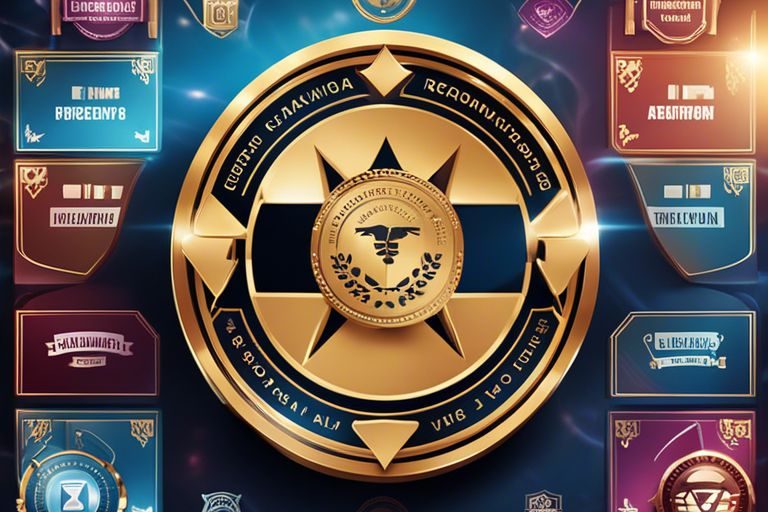iGaming Licenses – A Seal of Approval

It’s imperative for online casinos and gambling websites to obtain proper iGaming licenses in order to operate legally and provide a safe and secure environment for their players. These licenses serve as a seal of approval that the gaming site has met the necessary regulatory standards and requirements set forth by the licensing authority. The absence of a valid iGaming license can lead to severe consequences for both the operator and the players, including fines, legal actions, and loss of trust in the gaming platform.
Overview of iGaming Licenses
For any online gaming operator, obtaining a valid iGaming license is crucial for establishing legitimacy and gaining players’ trust. iGaming licenses serve as a seal of approval from regulatory authorities, ensuring that the operator has met specific requirements and standards to operate in a responsible and fair manner.
Definition and Types of Licenses
To operate legally in the iGaming industry, operators must acquire the necessary licenses from regulatory bodies. The two main types of iGaming licenses are local licenses and international licenses. Local licenses are issued by government authorities in specific jurisdictions where the operator intends to offer its services. International licenses, on the other hand, are obtained from recognized regulatory bodies that oversee online gambling on a global scale. Perceiving the differences between these licenses is crucial for operators to ensure compliance with the respective regulations and cater to a wider audience.
| Local Licenses | International Licenses |
| Issued by government authorities in specific jurisdictions | Obtained from recognized regulatory bodies |
| Restricted to operations within the issuing jurisdiction | Allow operators to offer services globally |
| Subject to local regulations and tax regimes | Require compliance with international standards |
| May have lower costs and requirements | Tend to have higher fees and strict criteria |
Historical Context and Evolution of iGaming Regulation
iGaming regulation has evolved significantly over the years to address the challenges posed by the online gambling industry. Contextually, the rise of the internet and digital technologies has transformed how people engage in gambling activities, leading to the need for robust regulatory frameworks to protect players and maintain the integrity of the industry. Strong consumer protection measures and responsible gaming initiatives have become central themes in iGaming regulation to combat issues like addiction and fraud.
Furthermore, the expansion of the iGaming market across borders has necessitated greater cooperation between regulatory bodies on an international level. This shift towards harmonization and standardization aims to create a level playing field for operators while upholding the highest standards of integrity and fairness. The ongoing evolution of iGaming regulation reflects a commitment to adapt to the changing landscape of online gambling and ensure a safe and enjoyable experience for players worldwide.
Licensing Authorities and Jurisdictions
There’s a multitude of iGaming licensing authorities and jurisdictions around the world, each with its own set of regulations and requirements. The choice of where to obtain a license can significantly impact the credibility and reputation of an online gaming operator. Renowned iGaming Licensing Bodies have strict standards and rigorous application processes to ensure player protection, fair gaming practices, and responsible gambling measures.
Renowned iGaming Licensing Bodies
iGaming licensing bodies such as the Malta Gaming Authority (MGA), the United Kingdom Gambling Commission (UKGC), and the Isle of Man Gambling Supervision Commission are considered among the most reputable in the industry. These regulatory bodies have a strong track record of enforcing compliance with regulations and holding licensees accountable for their actions. Operators holding licenses from these jurisdictions gain access to global markets, build trust with players, and demonstrate a commitment to operating ethically and responsibly within the iGaming sector.
Emerging Jurisdictions in iGaming Licensing
Malta has emerged as a popular choice for iGaming operators seeking a reputable license within the European Union. The Malta Gaming Authority offers a well-established regulatory framework, efficient application process, and a favorable tax regime for online gaming companies. Additionally, jurisdictions such as Curaçao, Gibraltar, and Kahnawake are gaining recognition for their efforts to regulate the iGaming industry and attract operators looking to expand their reach.
The Licensing Process
Many online gaming operators seek iGaming licenses to operate legally and demonstrate their commitment to providing a fair and secure gaming environment for players. The licensing process can vary depending on the jurisdiction, but it generally involves thorough scrutiny of the operator’s business practices, financial stability, and commitment to player protection.
Application Requirements and Procedures
The application process for an iGaming license typically involves submitting a detailed application form along with various supporting documents. These may include financial statements, a business plan, proof of software testing, and background checks on key personnel. The regulatory body will then conduct a comprehensive review of the application, which may include interviews with the operator’s representatives.
Costs Associated with Obtaining an iGaming License
The costs associated with obtaining an iGaming license can vary significantly depending on the jurisdiction and the type of license being sought. In addition to the initial application fee, operators may also be required to pay ongoing fees, taxes, and compliance costs. It’s important for operators to budget carefully and factor in these costs when planning their iGaming operations.
Requirements for obtaining an iGaming license can be stringent and costly, but they are necessary to ensure a safe and fair gaming environment for players. Regulatory bodies impose these requirements to protect players from fraud, money laundering, and other illegal activities that may occur in the online gaming industry.
Benefits of Holding an iGaming License
Trust and Credibility Among Players
To operate an online gambling platform, holding an iGaming license is important. It serves as a seal of approval that demonstrates a commitment to upholding the highest standards of operation, ensuring fair play, and protecting players’ interests. For players, seeing an iGaming license displayed on a website instills trust and confidence that the platform is legitimate and trustworthy. This trust translates into increased player loyalty and engagement, contributing to the long-term success of the online gaming business.
Legal and Financial Advantages
Legal and financial advantages are significant benefits of holding an iGaming license. From a legal standpoint, obtaining a license demonstrates compliance with regulations and can help mitigate legal risks. It provides a clear framework for operations, ensuring that the business operates within the bounds of the law. Financially, holding an iGaming license can open doors to partnerships with payment providers, banks, and other third-party services that may require proof of regulatory compliance. The ability to access these services can streamline processes, improve efficiency, and ultimately contribute to the growth and sustainability of the online gaming business.
Player Protection and Responsibility
Despite the entertainment value of iGaming, player protection and responsibility are paramount considerations for reputable gambling regulators. Licensing authorities ensure that operators adhere to strict guidelines and measures to protect players from potential harm.
Ensuring Fair Play and Integrity of Games
Protection mechanisms are in place to guarantee that games are fair and transparent for all players. Regulators require operators to use certified Random Number Generators (RNGs) to ensure the outcomes of games are unpredictable and unbiased. Additionally, regular audits are conducted to monitor the integrity of games and to prevent any manipulation or cheating.
Combatting Problem Gambling and Ensuring Responsible Gaming
Protection of vulnerable players is a top priority for iGaming regulators. Measures are implemented to combat problem gambling, such as self-exclusion programs, reality checks, and limits on deposits and betting amounts. Responsible gaming tools are provided to players to encourage healthy gaming habits and to prevent excessive gambling behavior.
With advancements in technology, operators are also utilizing artificial intelligence and data analysis to detect signs of problem gambling. By monitoring player behavior and patterns, operators can intervene and offer help to individuals who may be at risk of developing a gambling addiction.
Compliance, Violations, and Enforcement
Ongoing Compliance Requirements for Licensees
Compliance with regulations is a continuous process for iGaming licensees. They must adhere to strict requirements set by regulatory bodies to maintain their licenses. These requirements include ensuring the security and fairness of games, implementing responsible gaming measures, conducting thorough KYC (Know Your Customer) checks, and following strict anti-money laundering protocols. Licensees are expected to provide regular reports and audits to demonstrate their ongoing compliance with these regulations.
Consequences of Regulatory Violations
Regulatory violations in the iGaming industry can have severe consequences for licensees. Penalties for non-compliance with regulations can range from fines and warnings to suspension or revocation of the license. In extreme cases, criminal charges may be filed against the operators. Regulatory bodies have the authority to investigate complaints, conduct audits, and enforce penalties to ensure the integrity of the industry.
Ongoing monitoring and enforcement of regulatory compliance are necessary to maintain the credibility and trustworthiness of the iGaming industry. Regulatory bodies play a crucial role in upholding standards and protecting consumers from potential harm. By holding licensees accountable for their actions, regulatory authorities create a safer and more transparent environment for all stakeholders involved in online gaming.
The Future of iGaming Licensing
Trends Shaping the Future of iGaming Regulation
All iGaming operators must adhere to stringent regulations to ensure fair play and responsible gaming practices. Regulation is moving towards global standards to harmonize licensing requirements across jurisdictions. Transparency and accountability are becoming key focus areas for regulatory bodies to protect players and ensure integrity within the industry. Additionally, there is a rising trend towards increased collaboration between regulators and operators to address emerging challenges in iGaming.
The Impact of Technological Advancements on Licensing
Advancements in technology are revolutionizing the iGaming landscape, impacting licensing processes and requirements. Shaping the way licenses are issued, monitored, and enforced. Blockchain technology, for instance, is enhancing transparency and security in transactions, aiding in the prevention of money laundering and fraud. Virtual reality and augmented reality technologies are also being explored to enhance the gaming experience while ensuring compliance with regulations.
Impact: Technological advancements are reshaping the iGaming industry, presenting both opportunities and challenges. While innovations improve efficiency and security, they also raise concerns about data protection and cybersecurity. It is crucial for regulators to stay abreast of these developments to adapt regulations accordingly and foster a safe and fair gaming environment.
Conclusion
With these considerations in mind, it is evident that iGaming licenses serve as a seal of approval for online gambling operators. Obtaining a license from a reputable regulatory body demonstrates a commitment to upholding strict standards of fairness, security, and player protection. It also provides players with assurance that they are engaging in a safe and regulated online gambling environment.
Overall, iGaming licenses play a crucial role in the online gambling industry by establishing trust between operators and players. By choosing to only engage with licensed online casinos and betting sites, players can enjoy their favorite games with confidence, knowing that they are participating in a secure and responsible gaming experience.
Recommended Posts

The World of Wearable iGaming Tech
May 17, 2024

Going Live – Surge of Live Stream Gambling
May 17, 2024

Enhancing Payment Security with Blockchain
May 17, 2024




